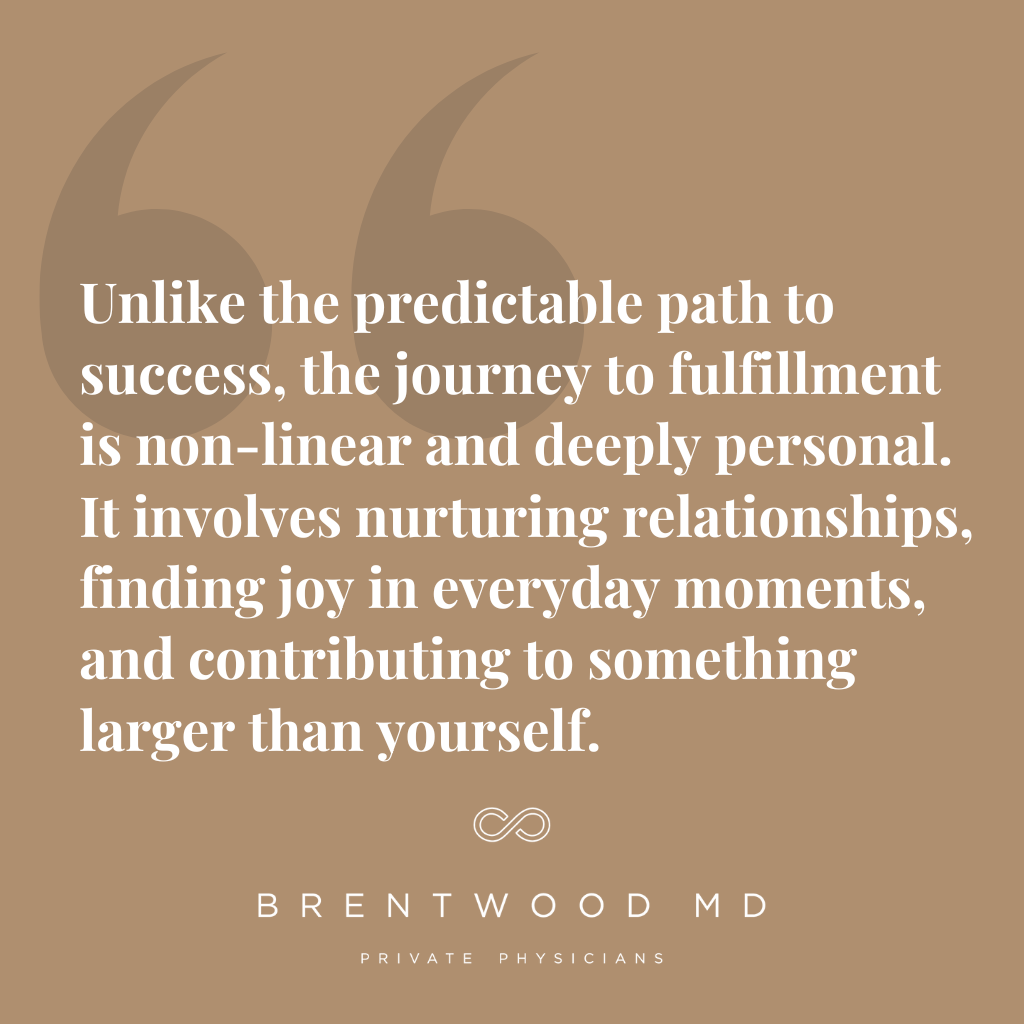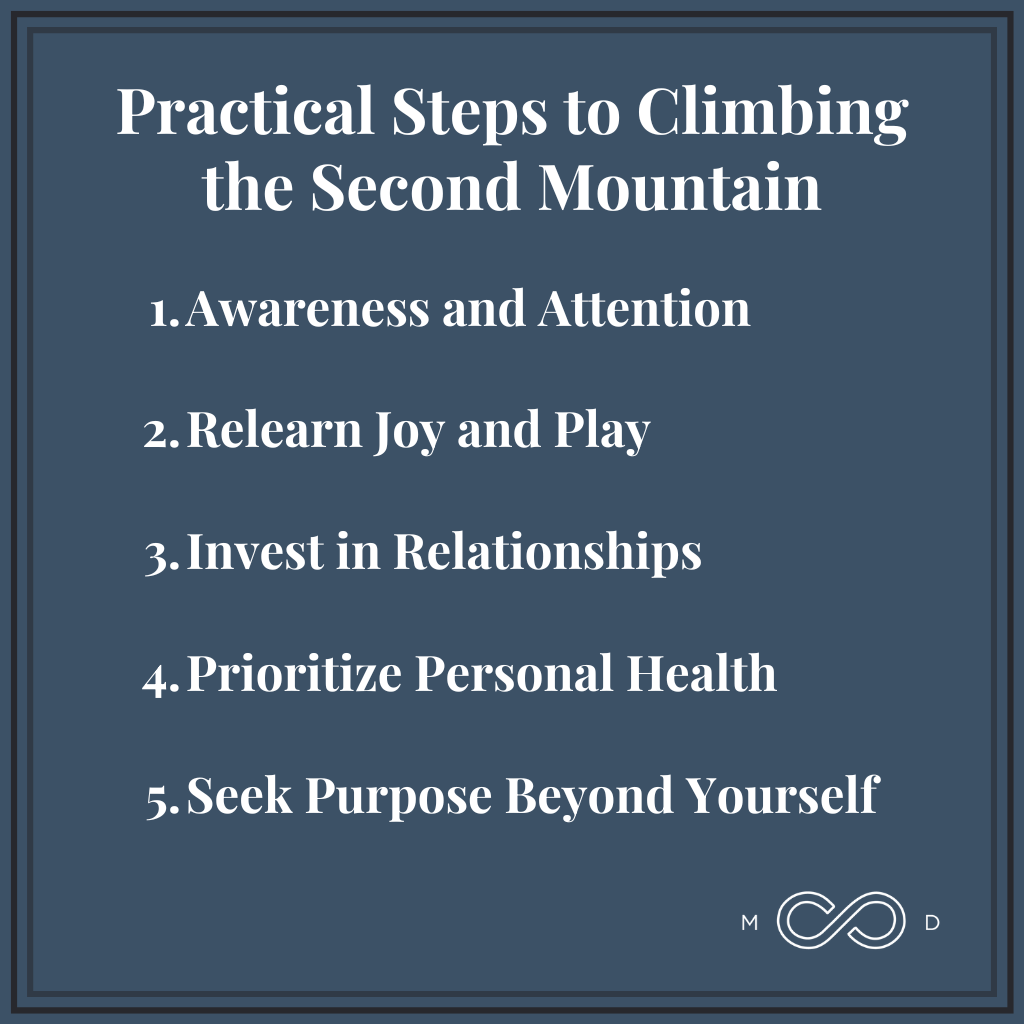In conversations with our members, one recurring theme has made me reflect on David Brooks’ thought-provoking book, The Second Mountain.
Brooks speaks of life’s journey as encompassing two metaphorical mountains. The first mountain is about achieving success — usually measured in tangible accomplishments like career milestones, economic stability, and social recognition.
But, as many remarkably successful individuals realize, scaling the first mountain doesn’t necessarily lead to a life of authentic joy, fulfillment, and purpose.
The second mountain, then, is where we find deeper meaning, happiness, and a sense of contribution beyond ourselves. And it’s important to identify the difference — because climbing higher up the first mountain will never get us there.
Understanding the Two Mountains
Think of the first mountain as the conventional path to success. It’s what society often emphasizes: work hard, climb the career ladder, achieve financial independence.
The first mountain is practical and formulaic. As long as you have clarity on your goals and persistently work toward them, success is almost inevitable. Most people work toward this in their 20s, 30s, and even early 40s. It’s a path of science and strategy — doing the right things in the right way for the right amount of time.
The second mountain is different. It’s about fulfillment and purpose. It’s the, “Isn’t there something more?” you feel after achieving financial security and career milestones.
Unlike the predictable path to success, the journey to fulfillment is non-linear and deeply personal. It involves nurturing relationships, finding joy in everyday moments, and contributing to something larger than yourself.
Success and Its Discontents
Because I work with highly successful individuals, most of my members aren’t experiencing too much frustration with the first mountain. They’ve solved for success; it’s something else that’s missing.
Despite their success, high-achievers often struggle to find deep happiness and fulfillment. In my experience and observation, this discrepancy stems from a hyper-focus on career and achievement during the younger years of adulthood.
Of course, these pursuits are necessary. You need to achieve success in the marketplace to support yourself and your family and even to contribute to society. You can’t just pursue personal happiness.
For contrast, consider young children. Left to their own devices with their basic needs met, most children naturally (and exclusively) pursue happiness — playing, exploring, enjoying life. Happiness is their default mode.
As they grow older, society imposes the need for practicality — paying bills, buying food, supporting a family. Life requires shifting focus from play to work.
It’s a normal and healthy shift. And some people even maintain a relative balance between marketplace success and the cultivation of personal fulfillment. From my observation, however, most of us fall into one of two categories:
- High achievement in personal fulfillment with low achievement in marketplace success
- High achievement in marketplace success with low achievement in personal fulfillment
For those in the latter category, the focus on achievement comes at a cost to personal relationships, pursuit of meaning, and genuine fulfillment. In many cases, they lose connection with the path to the second mountain that their childhood selves pursued unencumbered.
Many forget the second mountain exists at all.
Relearning the Art of Fulfillment
A hyper-focus on the first mountain often leads to the atrophy of our childhood “happiness muscles,” and by middle age, many of us have forgotten how to simply relax and be joyful.
As such, the journey to the second mountain begins by relearning skills that were once second nature — how to play, rest, and invest in relationships. Let’s take a look at my personal experience, for example.
After years of focus and sacrifice and grind, I found myself with substantial conventional success but also exhausted and disconnected from the simple joys of life. I had to pause, reset, and systematically reintroduce play and rest into my daily routine, retraining my mind and nervous system to appreciate moments outside the professional arena.
Focusing on soft skills like play and rest, especially when practical demands take precedence during the early stages of your career, requires conscious effort. I’d liken the process to going back to the gym after a long hiatus. It’s awkward, sometimes painful, but ultimately rewarding.
Balancing Success and Fulfillment
Achieving this balance is akin to feeding a two-headed dragon. On one head, success is essential — it pays the bills and provides short-term feedback and rewards. On the other, a life rich in relationships, personal health, and joy requires nurturing.
For most people, one head tends to dominate, taking resources away from the other and starving it over time. In other words, relationships suffer, health deteriorates, and work fills your world. A thought of, “I’ll rally on these other areas later,” buffers you for a while but eventually becomes unsustainable.
The result? A wildly successful career, yes, but often a human being who’s habitually unkind to themselves. A marriage that hasn’t felt alive in years. Adult children with their own families, and grief at a lack of connection to them.
Practical Steps to Climbing the Second Mountain
The good news? Recognizing this imbalance is the first step toward addressing it. I often find that awareness, followed by attention, are the greatest keys to making meaningful change in life.
In practical terms, though, I’ll list out a few key stepping stones on the path up the second mountain:
- Awareness and Attention: Start by recognizing the imbalance in your life. Are you overly focused on professional success at the expense of personal relationships, health, and/or fulfillment? Notice that — without judgment — and give it some attention.
- Relearn Joy and Play: Make a conscious effort to reintegrate activities that bring you joy. This could be hobbies, spending quality time with loved ones, or simple relaxation. Learn how to not work (at times) now that you’ve solved the success puzzle.
- Invest in Relationships: Cultivating meaningful relationships requires sustained effort. Invest daily time and energy into nurturing bonds with your loved ones.
- Prioritize Personal Health: Your physical and mental health are foundational to a fulfilling life. Regular exercise, a healthy diet, and mental wellness need your attention, too.
- Seek Purpose Beyond Yourself: Look for ways to contribute to something larger than yourself, whether through community service, mentorship, or creative pursuits.
Conclusion
The journey from achievement to fulfillment is both challenging and deeply rewarding. While scaling the first mountain is essential, true purpose and fulfillment aren’t what you’ll find at the top.
That’s an entirely different mountain and requires a parallel investment.
Scaling the second mountain requires a shift in perspective, a conscious effort to nurture personal well-being, cultivate intimate relationships, and commit to finding joy beyond professional accolades.
My goal is to help my patients and my readers foster a fuller, more vibrant human experience — one where success and fulfillment coexist and they thrive in both their personal and professional lives.
As you make room to navigate these two mountains, remember that both are integral to a life well-lived.

Dr. Aaron Wenzel is a concierge physician specializing in the care of fast-moving entrepreneurs, executives, and public figures in the Nashville, TN area. Dr. Wenzel’s diverse life experience and extensive training in family medicine, emergency care, nutrition, and hormone replacement therapies give him the unique platform to provide unmatched care for his patients.









